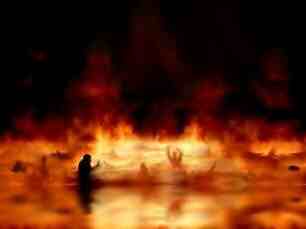No one can conceive, much less express, the infinite duration of Eternity. Between a living man and a statue,— between real and painted fire, there is an immense difference; yet, even these are said to be like each other.
But, between our fire and the fire of hell,— between our sorrows and the pains of the damned, there is not the slightest comparison; because the former are measured by Time, the latter by Eternity.
Christ has elegantly expressed this truth in the parable of the vine: "If any man abide not in me, he shall be cast forth as a branch, and shall wither, and they shall gather him up, and cast him into the fire, and he burneth." Here Eternity is very appropriately and very briefly described in one word,—"he burneth." All the other words of our Redeemer have a future signification: "He shall be cast forth, and wither; and they shall gather him up," But it is not said, "and he shall burn;" no: simply "he burneth."
This will be the unchangeable state of the reprobate, an undiminishing and ever-enduring present. A thousand years will pass away, and it will still be said, "he burneth;" another thousand, and still "he burneth," the very same as at the commencement. Thousands of years will succeed to thousands, and millions of ages to millions, until words will fail for the utterance of the tongue, and ideas for the conception of the mind, and still the same exclamation will arise from the bottom of hell, "he burneth.'"
And if, after this incalculable lapse of centuries, we should inquire, What such a damned soul is doing? What is he suffering? The very same answer would be returned: "he burneth" in unquenchable, indescribable, and eternal fire. And thus it will be from year to year, and age to age, for ever I for ever! On this passage of Holy Scripture St. Augustine has beautifully observed: "The branch is subject to one of these alternatives; it must either abide in the vine, or in the fire; if it grow not in the vine, it will burn in the fire. That it may not be cast into the fire, let it, therefore, abide in the vine."
Link (here) to read passage in the 17th century Jesuit classic by Fr. Jerome Drexelius, S.J. his book is entitled, Nine Considerations on Eternity.











1 comment:
"Many times I am seized with the thought of going to the schools of your lands and there cry out like a man who has lost his mind, and especially at the University of Paris, telling those at the Sorbonne who have a greater regard for learning than for charity, so that they might dispose themselves to produce fruit with it: “How many souls fail to go to glory but go instead to hell through your neglect” (January 15, 1544; Georg Schurhammer, S.J., Francis Xavier, His Life and His Times, II, -p. 407).
Post a Comment